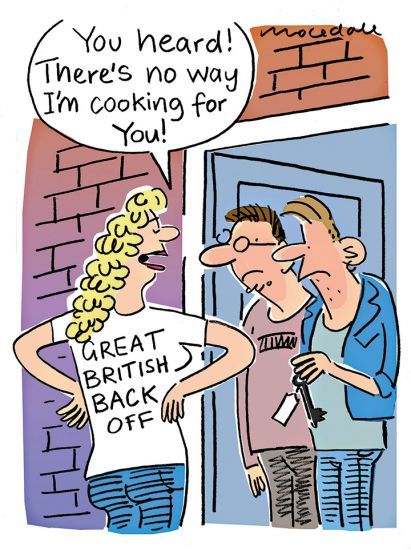
Just in time to divert us from the latest Brexit omnishambles, the new series of The Great British Bake Off has hit the country’s television screens. But one contestant has already sparked a collective rolling of the eyes in academia after revealing that her love of baking came from having been “mother” to her seven male housemates at university, teaching them “to cook, bake and generally become competent adults”, according to the i. Among those not impressed with Ruby Bhogal’s comments was Charlotte Riley, lecturer in 20th-century British history at the University of Southampton, who used Twitter to warn women starting university this autumn not to “perform loads of unpaid emotional labour for Peter Pan boys”, and asked male undergraduates not to “perform being useless at basic adult tasks like it’s cute”. One Twitterer suggested that Ms Bhogal’s cake-baking might have been part of a reciprocal exchange: perhaps the contestant’s flatmates “changed the oil or spark plugs or a wheel on her car, or put some flat pack furniture up, or explained the offside rules in return”.
The lexicon of university campuses is always changing, with terms such as “touching base”, “bandwidth” and “deliverables” all becoming commonplace utterances in recent years, for better or worse. Now researchers at the University of Leicester are hoping to add another, slightly more surprising term to this everyday vocabulary: “menopause”. The Times reported on 22 August that staff at the Midlands institution were being encouraged to say the word three times a day in a bid to break down taboos. The university suggested that the term had been received more positively than other recent campus neologisms. “The results have been surprising – it has helped men as well as women talk confidently about menopause,” Leicester told the newspaper.
Not to be outdone by the UK or the US – or anywhere else for that matter – Australian politics has gone absolutely barmy in recent weeks. But as Times Higher Education went to press, the view in the higher education sector was that the ousting of Malcolm Turnbull as prime minister and the elevation of former treasurer Scott Morrison to the post was a lot more palatable than the alternative scenario, in which conservative former home affairs minister Peter Dutton claimed the top job. Education minister Simon Birmingham was tipped to retain his portfolio, offering the sector some stability at least, and a Morrison premiership is viewed as being less likely to drive a downturn in international student recruitment.
US President Donald Trump has had plenty of problems of his own to deal with in recent weeks. But students at Virginia’s Liberty University may not have heard about them, at least not in the campus press – not if Jerry Falwell Jr, the institution’s Trump-loving president, has anything to do with it. An investigation by the Christian magazine World reveals that Mr Falwell had begun reviewing articles in the campus newspaper, Champion, that mention Mr Trump. On one occasion, he made editors sign off opinion pieces with a note about how they were voting; on another, he spiked an article altogether. According to World, Bruce Kirk, dean of the School of Communication and Digital Content, told new recruits to the publication that their job was to protect the reputation of Liberty and warned them against “do[ing] journalism”. “Let’s get that notion out of your head. OK?” he was quoted as saying.
A University of Bristol PhD graduate who co-founded a spin-off company during his studies four years ago is set to become a multimillionaire after it was sold to one of the world’s biggest pharmaceutical firms. Ziylo – which Harry Destecroix founded with his former PhD supervisor Anthony Davis and businessman Tom Smart – is developing “smart insulin” technology pioneered by Professor Davis that can adapt to different levels of glucose in the blood. The firm has been sold to Danish giant Novo Nordisk in a deal that could be worth £620 million, The Times reported on 21 August. Dr Destecroix said that although it was “all a bit overwhelming”, he hoped that the huge sums involved could be ploughed back into helping to commercialise more science in the Bristol area. He has already helped set up a science incubator in the city called Unit DX, which provides lab space for other start-up firms.